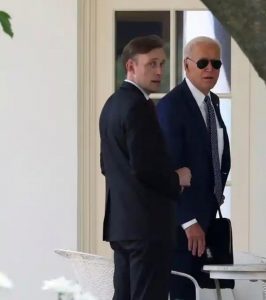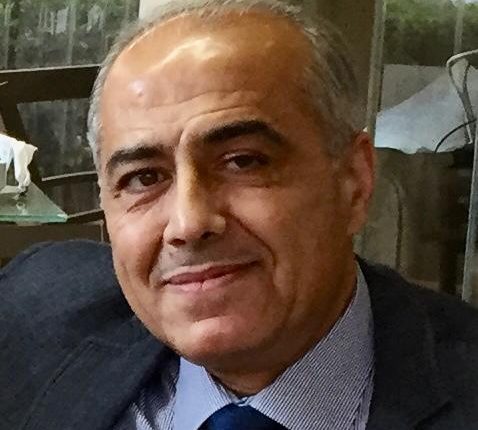US NATIONAL SECURITY ADVISOR AND THE TASK OF PSYCHOANALYTIC THERAPY
*By General Monzer El Ayoubi
Translation: Dr Pierre A. Sarkis

Between the Ukrainian capital Kiev and Tel Aviv, US National Security Advisor Jake Sullivan was on his plane “the roaming clinic” on a psychoanalytic therapy mission, reviewing the two files which receive special consideration from the US Administration, largely consistent with political analysis or diplomatic treatment, aiming at addressing or relieving mental confusion, reassurance from fears, exclusion from misgivings and regular interaction to overcome problems with the aim of alleviating troubled behaviors, as well as, disturbing motives, ideas and emotions.
The two treatment sessions involve the characters Naftali Bennett, Prime Minister of the Zionist entity and Ukrainian President Volodymyr Zelensky, and from the standpoint of the competency and technical merit of Sullivan, who will start “talk therapy” based on his prominent role for years in the round of negotiations, which resulted in the initial Geneva Agreement on the Iranian nuclear program. In the same file, Sullivan’s not too restrictive fingerprints were recorded on May 8, 2018, with a pragmatic comment on US Secretary of State Mike Pompeo’s performance and former US President Donald Trump’s decision to exit the 5+1 agreement, in parallel with the lifting of economic sanctions, with the statement: “They tied their hands in the Iranian file.”
In timeliness, and based on its intelligence, Tel Aviv considers Tehran to be on the verge of the nuclear doorstep, even the ability to possess a nuclear bomb, especially after its success in producing nuclear fuel domestically. It also considers that the return of the United States to the Geneva negotiations, even indirectly, may result in a new agreement in a modified format according to the degrees of the enrichment of its provisions over time, and could be a strategic mistake that has implications for the stability of the Middle East. It will enhance Iran’s military capabilities, influence, and role in the region, and most importantly, renew the concerns of the existential danger to the Zionist entity, after the respite of temporary normalization in time and effect with the Arab states. In parallel, Israel fears that history will repeat itself when Washington surrendered to North Korea’s acquisition of nuclear weapons, after the latter withdrew from the Nuclear Non-Proliferation Treaty (NPT) in 2003.
In the same context, between the Israeli and the American, strategies rarely differ even if tactics contradict, and a number of military analysts and strategists consider that the agreement on Iran’s nuclear program has become less important, according to the equation of “mutual nuclear annihilation” for it has become a negotiating cover, or a secondary item behind the most important priority which is the accurate ballistic missile program. Noting that the Islamic Republic has on the scale of the Middle East Region the largest system of ballistic missiles varying in range between 45 and 10000 km, in addition to the mobile, accurate and long range Hoveyzeh and Soumar missile systems which render the coasts of Alaska, most of Europe and parts of Asia (including occupied Palestine) in its range.

In the interim remedy, the joint press conference “Bennett-Sullivan” referred to the development of a joint strategy that reflects Washington’s commitment to addressing the Iranian threat, in addition to setting a time limit for the completion of the nuclear agreement on strict terms, to resolve the adopted method of procrastination and delaying tactics. And without mentioning any of the following in the media, about the difficulty of ensuring the outcome of any attack on Iran and the refusal of the Pentagon leadership to get involved in an open war with her, it was left to the American and Israeli military commands to discuss the scenarios of a limited military strike that can be directed, and limit its repercussions with the aim of destroying Iran’s nuclear facilities, in the event of the failure of the negotiating process, or reaching a fragile ineffective agreement allowing her to circumvent the incorporated conditions.
Meanwhile, with his arrival in the Ukrainian capital Kiev, Russia’s strategic vital space from the Southwest, which includes the Ukraine, the Crimea and the Black Sea was becoming increasingly tense. Amid a Russian warning against allowing the Ukraine to join NATO, which was met with European-Atlantic warnings of a full-scale expansion or a Russian invasion of the country, the meeting of US National Security Advisor Jake Sullivan with the Ukrainian Director of the Presidential Office, Andrii Yermak, and Ukrainian Foreign Minister Dmytro Kuleba, came as an interpretation to the phone call on the 10th of the current month, between President Biden and his Ukrainian counterpart Volodymyr Zelensky. Next, if Chancellor Sullivan’s mission is to allay Kiev’s concerns and fears with sedative pills and stem the slide towards open war surgery, the most important thing is Washington’s implicit French-coded decision not to respond to Ukraine’s request to join NATO, as long as it is sponsored and supported by the US in order to avoid any provocative move against Moscow. Russian President Vladimir Putin warned against the move, saying that NATO’s proximity to its borders is a red line and a very important matter threatening the national security of Russia and its people.
Ukraine’s response to the lack of options appears to have crystallized after President Zelensky announced his country’s commitment to a peaceful solution in the Donbas region, with new proposals for a return to the stalled peace talks. Last, and in a comment about the shaky stability in the region or in Eastern Europe, Sullivan considered that there is no Russian decision to inflame the situation around the Ukraine, based on diplomatic data and intelligence. Conversely, and in a reference carrying a comprehensive indication to Russian President Vladimir Putin, he said “We cannot infiltrate into the head of any world leader for there are always restrictions on what we know or do not know.”
*Scholar in Security and Strategic Affairs
Beirut, 30/12/2021

